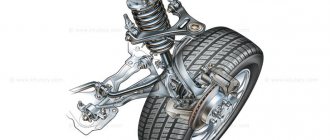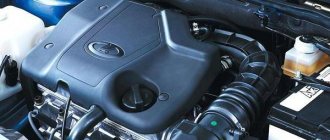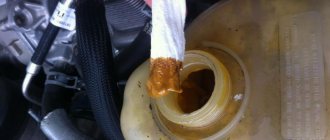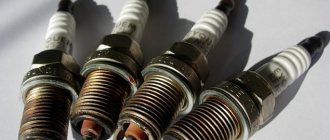Sometimes owners of cars equipped with gas equipment are faced with a problem when the engine does not switch to gas when the 4th generation of gas equipment is installed, and continues to run on gasoline. In today's article, we will try to understand the reasons why the LPG does not switch to gas, or immediately stalls after switching.
Possible cause of the problem
In order to understand why failures may occur when turning on the HBO, it is necessary to recall how the installation works.
Unlike the second generation for carburetor and injection cars, where switching is performed forcibly by an equipment button or semi-automatically (based on engine speed), in the fourth generation, the transition from gasoline to gas is controlled by an electronic unit (ECU) in automatic mode.
The controller reads readings from the sensors; if the parameters match those programmed into it during setup, the gasoline injectors are turned off and the gas injectors are turned on.
Thus, if the LPG does not switch from gasoline to gas or switches late, the unit’s power button begins to beep and blink and the car stalls, the main causes of the failure may be:
- insufficient coolant level in the car system;
- air plug in the housing of the GBU evaporator reducer;
- malfunction, defect or incorrect installation of the evaporator temperature sensor;
- MAP sensor malfunction or incorrect installation;
- The installation fuse has blown/oxidized.
In addition, the cause of the defect may be:
- incorrect installation of the gearbox or wear of its membrane;
- contamination of the supply line, as well as filter elements (pressure loss); breakdown/defect of “gas brains”;
- Damage or clogging of LPG injectors;
- wear of electric valves and their coils;
- incorrect equipment settings.
Filters
Clogged coarse filter or liquid phase filter. If the car owner has not undergone maintenance for a year or more than 10,000 km. path, then the liquid phase filter is most likely clogged and requires replacement.
You may be interested in an article on how to replace filters with your own hands on 4th generation LPG.
Solution: Replace the coarse and fine filters.
What to do if HBO does not switch to gas
In most cases, it is possible to detect and repair a breakdown with your own hands.
Airlock
So, the first thing you need to do is bring the level of antifreeze/antifreeze in the expansion tank to normal. Then, by pressing on the radiator pipes and simultaneously releasing gas, try to “drive” the air plug out of the evaporator reducer. If this method does not help, and you are also sure that there is air, then you need to remove the output hose from the gearbox and drain a small part of the liquid (by starting the internal combustion engine for a couple of seconds), after first replacing it with a clean container.
You can detect the presence of a plug in the following way: heat the car engine to operating temperature, compare the heating intensity of the pipes and the evaporator itself.
Next, check the correct installation of the gas equipment (we wrote about this here), also inspect the mechanical damage to the installation, and the presence of kinks in tubes/hoses.
Temperature sensor
If the work done does not give a positive result, you need to make sure that the wires going to the gearbox temperature sensor are intact, and also make sure that its connectors are free of traces of oxidation. Wiring twists are not allowed here, only soldering or secure terminals.
If there is no visible damage to the evaporator temperature indicator, its diagnosis is required. You can find a defect, knowing the parameters (resistance) of a particular sensor, using a multimeter. And if you have a cable for adjusting/diagnostics of gas equipment, as well as software, it will be possible to identify the fault much faster.
The reason that the HBO does not switch to gas (4th generation) is usually a breakdown of the sensor or adjustment of its operating parameters. If adjusting the values does not produce results, it will need to be replaced or repaired.
As an option, to start the gas installation, you can try to short-circuit the sensor wires and then get to the place where it is purchased/repaired.
Problems with the 2nd generation of HBO
In a situation where the 2nd generation of LPG on an injector or carburetor does not switch to gas, there are usually three reasons:
- airing of the gearbox or low fluid level;
- malfunction of the fuel type switch button;
- failure of the gas solenoid valve coil.
You can find all other causes and methods for eliminating them by following the links in the article. If you still have questions, ask them in the form below, we will definitely give a detailed answer.
Main malfunctions of HBO
For the first and second generation of HBO
Settings
Do-it-yourself diagnostics of 4th generation HBO can be carried out by installing the equipment on the car yourself. To do this, you will need a diagnostic scanner or a laptop with the appropriate program.
With the help of such devices, the fuel correction of the ECU is determined. It is calculated as a percentage of normal fuel injection. The reference readings of the monitoring sensors are taken as a basis. The equipment is configured in such a way that the correction occurs within +-5%. Tuning is best done under load. Afterwards the result is checked at idle speed. Typically no additional configuration is required.
What other problems can there be on a car with HBO?
If the fuse on the main plus of the LPG system has burned out or oxidized, the fuel switch button will not work. Replacing the fuse will resolve the issue.
Malfunctions in the operation of the engine where landi renzo equipment is installed may not necessarily be associated with gas equipment. It is necessary to analyze at what point a situation arises when the internal combustion engine does not switch to gas.
When the speed is floating, the internal combustion engine does not operate smoothly; you need to look for the root cause in the following:
- You need to check the ignition, unscrew it and see what condition the spark plugs are in.
- Be sure to check the compression of the internal combustion engine on the bench.
- Contact a mechanic and have the valves balanced.
- Pay attention to the performance of the lambda probe.
- Adjust gas injection, check injectors.
- There may be malfunctions in the timing of the motor.
Sometimes drivers notice that a gas engine loses its power characteristics. The following breakdowns must be excluded:
- gas injectors do not cope with their task and are poorly adjusted;
- the reducer does not create the necessary pressure due to poor heating;
- the fault is a non-working lambda probe;
- gas filters are clogged;
- blockages in gas lines.
HBO is installed to save fuel. If excessive gas consumption occurs, you need to look for the cause of possible problems:
- broken gearbox, low pressure;
- clogged air filter;
- problems with the ignition system;
- The gearbox does not want to warm up.
- the operation of the gas injectors or injection system is disrupted;
- compression in the internal combustion engine is below normal;
- calibration fittings for injectors are selected incorrectly;
- factory defect of the lambda probe.
If there are failures during re-gassing, you need to re-calibrate the injectors, change the filter, see what pressure is in the reducer and check the integrity of the gas lines.
Useful tips
When the engine starts to run poorly when switched to LPG, or the gas equipment does not turn on, there is no need to tempt fate and bring the car to a state where it will no longer start at all. It is better to drive on gasoline until the problem is fixed.
The internal combustion engine will not switch to gas automatically if at least one of the sensors (temperature, pressure) is faulty or the gearbox is not heated. If there is no impulse from the tachometer, automatic switching to gas is not possible.
It is highly undesirable to repair gas equipment yourself. To do this, you need to understand the system and have the appropriate diagnostic equipment. First of all, you need to contact the specialists who installed the gas equipment to fix the problem.
When gas-cylinder equipment turns off at the most inopportune moment, it is often the fault of the drivers themselves, who do not want to understand the operation of the system and do not perform regular preventive inspections at the service station.
Breakdowns can occur in cars running on methane or propane-butane. Not all LPG manufacturers take into account that the car will not always be filled with fuel that meets European quality standards. Installing the system in a certified center will minimize the likelihood of problems with gas equipment and engine operation in general.
Additional Information
Regarding HBO-4, such systems use more advanced switches. Such switches have only 2 operating positions: turn on the gas and turn off the gas. Many switches for 4th generation gas equipment have an indication of the remaining fuel in the cylinder .
When you turn on the gas on modern gas equipment, an automatic system will be activated, which controls not only the warm-up temperature of the gearbox, but also the crankshaft speed of the Daewoo Nexia.
Unfortunately, in HBO-2, like in HBO-4, there is no possibility of starting a cold engine on gasoline. But this option is available in HBO-4+ and HBO-5. To start a cold engine on gas, you need special injectors that are not susceptible to icing .
Many Daewoo Nexia drivers note that the operation of HBO-2 is highly dependent on the street temperature. There are known cases when, in frosts of -10 C, gas-cylinder equipment refused to start. Of course, a lot depends on the components used, as well as the settings of the gas equipment. But if you compare the operation of GBO-2 and GBO-4, then with the fourth generation of gas equipment there are usually much fewer problems .
The number of problems with gas equipment can be reduced to a very minimum if you do not forget about the need to undergo routine inspections and repairs of gas equipment . It is necessary to regularly change fuel filters and gaskets . The gas reducer requires periodic cleaning, as do the gas injectors.
High-quality gas equipment maintenance will ultimately pay off in fuel savings. At the same time, the safety and comfort of movement will increase.
Types of sensors
Gas equipment of any generation is a complex system of several components, one of which is sensors. These hardware design elements are divided into two types:
Gas equipment began to be organized in a similar way from the second generation, but only in the fourth generation did the use of sensors become widespread. Of course, all manufacturers have differences in LPG sensors, but in general terms the principles of their design and operation are the same.
Operating principle and differences between buttons
The 1-2 generation button on the carburetor has two working positions and one neutral.
- I – the engine starts and runs only on gasoline (gas valve is closed, the red light is on).
- II – The internal combustion engine switches to gas, while the gasoline electric valve closes and the green lamp lights up.
- 0 (Neutral) – serves to burn gasoline from the carburetor float chamber.
Changing the fuel type should only occur through the neutral position. If you turn on the gas right away, two types of fuel will enter the combustion chambers and the engine will most likely stall.
Some copies have an indication of the fuel level in the cylinder, as well as an additional button for the pre-start supply of a portion of gas, which is needed to enrich the mixture when starting a warm engine on gas (for example, Lovato, Logo buttons for a vacuum reducer).
A key such as, for example, Stag 2-G already has a pre-start function built into it, with the ability to adjust by time.
In the injection version, instead of the middle position, there is an automatic mode (on some types, such as Stag 2-W, it can be extreme). In this position, the engine starts on gasoline, and when a certain engine speed is reached, the gas supply is automatically turned on.
The transition speed is regulated using a potentiometer on the side surface of the housing. This key can also come with a level indication.
The universal option involves installing a toggle switch on both the injector and the carburetor. The transition between modes is carried out using a jumper/jumper on the case (example SVG switch).
The 4th generation HBO button has an LED indication and 2 operating modes on/off. In the on position, the gas turns on automatically after the reducer-evaporator warms up to 35-45˚C. The temperature is programmed in the controller when setting up the equipment.
Button signals using Stag as an example:
- LED is on/off – the engine is running on gas/gasoline;
- blinks at intervals of 1 second. – the engine is not warmed up;
- flashes every 2 seconds – the system is ready to switch to gas;
- blinks every 4 seconds – the tank has run out of fuel;
- the buzzer beeps three times - the system switches from gas to gasoline due to lack of fuel;
- three short signals 1 long – ECU (control unit) error;
- two short beeps 1 long beep (with the ignition off) – maintenance of gas equipment is required.
In addition, the fourth version of the gas system has an emergency start on gas. The mode is activated as follows: hold the button with the ignition off until the LED lights up continuously. Then, without releasing the key, we start the engine. Deactivation occurs after stopping the internal combustion engine.
Types of buttons (video):
Selection table (with approximate prices):
| Name/labeling | injector/carburetor/generation | Level indication, +/- | Price in rubles |
| REG OMVL Dream XXI King | engineer/4 | + | 1020 |
| Logo 145 | engineer/4 | – | 280 |
| Logo 101 | carb./1.2 | – | 470 |
| Atiker (K01.003.000.020) | carb./1.2 | + | 600 |
| Stag 2-G | carb./1.2 | – | 550 |
| AEB 722 | carb./1.2 | + | 1050 |
| Tamona K-5 | carb./1.2 | – | 520 |
| Lovato | carb./1.2 | – | 590 |
| Torelli | carb./1.2 | + | 630 |
| Stag 2-W | engineer/2 | – | 600 |
| Tamona in-3 | engineer/2 | – | 540 |
| Stag LED-401 | engineer/4 | + | 750 |
| Stag LED-300 | engineer/4 | + | 580 |











